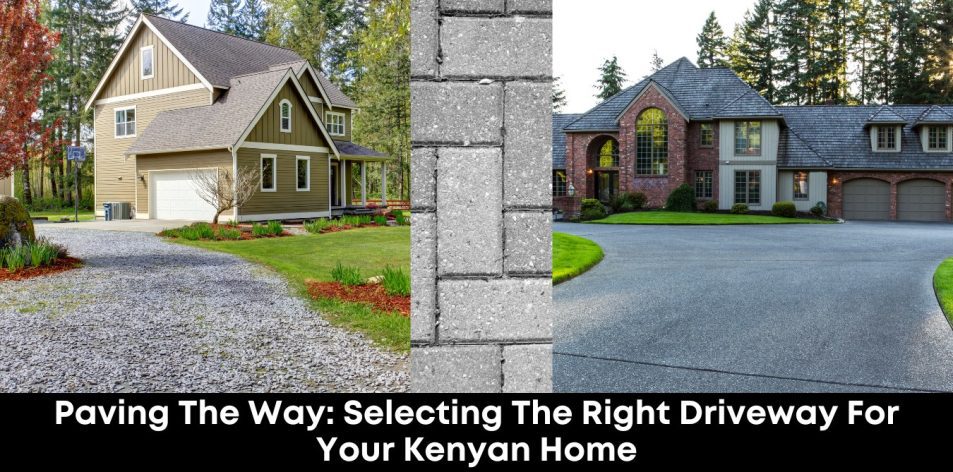Comparing Durability and Cost on Red Soil and Black Cotton Terrain
The driveway is a critical component of your property, influencing both the home’s curb appeal and its functionality. In Kenya, the prevalent soil types—stable red soil and challenging black cotton soil—must heavily influence your choice of material, impacting both the initial cost and long-term durability. This guide explores the different types of driveways available, comparing their suitability, cost, and lifespan, particularly in the context of common Kenyan soil conditions.
I. Understanding Driveway Options
1. Gravel Driveways (Murram)
Gravel, often referred to locally as murram or crushed stone, is one of the most common and traditional driveway materials.
- Cost: Very low initial cost; generally the most affordable option.
- Durability: Low to Medium. Requires frequent raking, grading, and replenishment, especially after heavy rains.
- Aesthetics: Natural, rustic look.
- Suitability in Kenya:
- Red Soil: Good. The natural drainage of red soil helps prevent the sub-base from becoming waterlogged.
- Black Cotton: Poor. The shrink-swell cycle of black cotton soil makes it highly unstable. The murram will shift, erode, and sink quickly, requiring constant maintenance. Requires a very deep, costly sub-base preparation.
2. Cabro / Paving Blocks
Paving blocks (often known by the brand name ‘Cabro’) are individual interlocking concrete bricks laid over a compacted base layer of sand and gravel.
- Cost: Medium to High. Higher initial labour and material costs than gravel or plain concrete.
- Durability: High. Extremely durable, easy to repair (individual blocks can be replaced), and excellent at handling vehicle weight.
- Aesthetics: Highly customisable with various shapes, colours, and patterns.
- Suitability in Kenya:
- Red Soil: Excellent. The interlocking system and stable base work very well with the firm, well-draining red soil.
- Black Cotton: Good, but Requires Proper Base. The base layer must be significantly thicker and more heavily compacted than on red soil, sometimes requiring a geotextile fabric or a layer of well-compacted murram to minimise the effects of soil movement. This increases the cost.
3. Concrete Driveways (Plain or Stamped)
Poured concrete creates a solid, hard surface that is very durable and requires a strong, well-prepared sub-base.
- Cost: Medium to High. Costs are moderate but increase significantly if you opt for stamping or colouring.
- Durability: Very High. Extremely long lifespan with minimal maintenance, provided the sub-base is stable.
- Aesthetics: Clean, uniform, and can be coloured or stamped for a decorative look.
- Suitability in Kenya:
- Red Soil: Excellent. Provides a stable, permanent surface. Expansion joints are essential to prevent cracking due to temperature changes.
- Black Cotton: Challenging/Expensive. The concrete slab will crack due to the shifting black cotton soil underneath unless a highly reinforced raft foundation or deep, expansive soil removal is undertaken. This makes the concrete driveway much more expensive than on red soil.
4. Asphalt Driveways (Tarmac)
Asphalt is a petroleum-based material laid hot and compacted, often chosen for its smooth surface.
- Cost: Medium. Generally cheaper than Cabro or reinforced concrete initially.
- Durability: Medium. Requires periodic sealing (every few years) and can soften or crack under extreme heat or heavy loads.
- Aesthetics: Smooth, black finish.
- Suitability in Kenya:
- Red Soil: Good. Works well, but needs proper drainage along the edges to prevent water erosion.
- Black Cotton: Poor. Highly susceptible to deformation (rutting, cracking) when the unstable soil moves beneath it. Significant sub-base preparation is required, similar to concrete, making it costly.
II. Selecting the Right Driveway Based on Soil Type
Your choice should be dictated by the long-term stability and maintenance requirements related to your soil:
- Red Soil (Stable Soil): For red soil, Cabro (paving blocks) is often the optimal choice. It offers high durability, excellent drainage, easy repairability, and good aesthetics at a manageable high-end cost. Concrete is also excellent but less flexible for repairs.
- Black Cotton Soil (Expansive Soil): The main concern is movement. The best and most durable option that offers a balance of cost and performance is a properly installed Cabro/Paving Block driveway. The individual blocks have enough flexibility to handle slight soil movement without cracking severely like a rigid concrete slab would. Crucially, any installation on black cotton must include an expertly prepared, deep, and well-compacted sub-base (using murram and a stable drainage layer) to minimise the shrink-swell effect.
III. Final Cost and Durability Summary
When budgeting, remember that the cost of the base material often represents only 30-50% of the total cost; the labour and the cost of site preparation (especially on black cotton) are often the biggest variables. For a long-term investment that provides the best value on both soil types, a well-prepared Cabro/Paving Block driveway is usually recommended for the average Kenyan home due to its repairability and flexibility.

